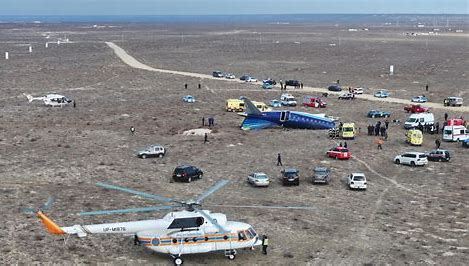The CEO of Jeju Air has been placed under a strict travel ban following a tragic plane crash on Sunday that claimed the lives of 179 out of the 181 people onboard. The deadly incident, involving Jeju Air Flight 2216, has shaken South Korea and raised serious questions about aviation safety in the country.
Kim E-bae, the chief executive of Jeju Air, has reportedly been barred from leaving South Korea as authorities intensify their investigation into what is now being considered the deadliest air disaster in South Korean history. The crash occurred shortly after the Boeing 737-800, operating Flight 2216, had taken off from Muan International Airport in the southwestern part of the country.
A Night of Tragedy
Flight 2216’s final moments were grim. The aircraft, a Boeing 737-800, encountered a bird strike shortly after departure. The pilot, who was in communication with air traffic control, reported the collision, indicating potential problems. What followed was a disastrous sequence of events.
“From the preliminary data gathered from the black boxes, it is clear that the aircraft belly-landed on the runway, with the landing gear not deployed,” said Lee Joo-seok, a spokesperson for the South Korean Ministry of Land, Infrastructure, and Transport. “The aircraft skidded into a concrete embankment less than 300 meters from the runway’s end, catching fire and claiming almost all lives on board.”
Two hundred and sixty-four people were aboard Flight 2216, with 179 confirmed dead by authorities, including 171 passengers and 8 crew members. Only two survivors are reported to have been critically injured.
As the investigation moves forward, South Korean police have carried out multiple raids, targeting not just Jeju Air’s offices, but also regional aviation bodies and the airport authority. The Jeonnam Provincial Police Agency, which is leading the investigation, confirmed that they seized critical documents and other materials during the early morning operation on Thursday.
Boeing 737-800 Under Scrutiny
Aviation experts have voiced concern over the Boeing 737-800 model, with some pointing to possible mechanical failure as a factor in the disaster. The aircraft’s black box data has been retrieved, but the second black box was too damaged to be analyzed locally. Authorities have decided to send it to the United States for a more thorough examination.
“While the black boxes have revealed certain details, it is too early to confirm the exact cause of the crash,” said Professor Kim Seung-ho, a renowned aviation safety expert at Korea Aerospace University. “The bird strike could have contributed to a series of failures, but we are also looking at potential maintenance issues and the structural integrity of the aircraft.”
Adding to the complexity of the investigation is the discovery of the hardened embankment near the runway, which has been described as a contributing factor. Aviation analysts have pointed out that an obstacle that close to the runway’s end may have made a critical difference in the outcome of the crash, particularly if the plane was already struggling to maintain altitude.
Police Raid Jeju Air and Muan Airport
As investigations continue, South Korean officials have ramped up efforts to determine whether negligence or malfeasance played a role in the crash. In an unprecedented move, the authorities raided Jeju Air’s headquarters in Seoul, as well as the offices of the Muan International Airport, where Flight 2216 had originated.
“The investigation is not limited to the flight’s immediate circumstances,” explained Han Hye-jin, an aviation safety consultant based in Seoul. “The raids suggest that there may be concerns about broader safety practices at Jeju Air and within South Korea’s civil aviation industry.”
As part of their inquiry, the South Korean government is also undertaking an extensive inspection of all Boeing 737-800 aircraft currently in operation within the country. This follows an earlier statement from South Korea’s acting president, Choi Sang-mok, who stressed the need for swift and decisive action if any aircraft are found to be defective.
“The safety of passengers must come first,” said Choi in a televised address. “If there are flaws within the Boeing 737-800 model or in the operational practices of Jeju Air, we will not hesitate to take immediate corrective action.”
Jeju Air CEO Under Investigation
Kim E-bae, the CEO of Jeju Air, is at the center of this investigation. Although he has not been formally charged with any wrongdoing, the government’s decision to impose a travel ban on him indicates the gravity of the situation. Authorities have cited the need to ensure that he remains accessible to investigators as they delve deeper into the cause of the crash.
“The travel restriction is a preventive measure while investigations are ongoing,” said a source within the Ministry of Transport. “It is standard procedure in high-profile aviation incidents to ensure that key figures involved in the operation are available for questioning.”
Kim, who took over as CEO of Jeju Air in 2022, has yet to make a public statement regarding the incident. However, the airline has expressed condolences to the families of those lost and confirmed that it is fully cooperating with the investigation.
“We are deeply saddened by this tragedy and offer our heartfelt sympathies to the victims and their families,” said Jeju Air in a statement. “We are committed to working with the authorities to determine the cause of the crash and to ensure that such an event never happens again.”
The Aftermath: Widening Concerns for South Korean Aviation
The crash of Jeju Air Flight 2216 has cast a long shadow over South Korea’s aviation industry. While the country has a solid record of safety in air travel, this disaster has raised concerns about the adequacy of regulations and oversight, especially with the continued operation of older aircraft models like the Boeing 737-800.
For now, all eyes are on the investigation and what conclusions will emerge in the coming weeks. As the country mourns the victims, many are questioning whether enough is being done to prevent such tragedies in the future.

